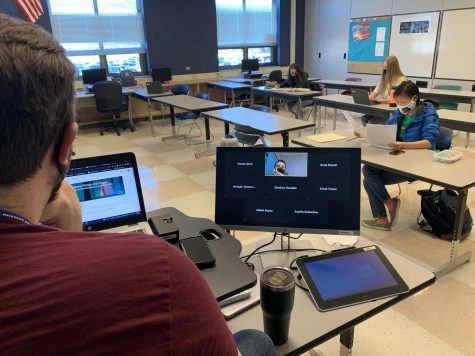To Turn My Camera On or Off? That Is The Question
January 22, 2021
Every morning at 7:20 on the dot, students like myself are posed with one burning question: should I turn my camera on or off?
Although a simple question, it does not have a simple solution.
Your gut instinct may be to vote “camera on.” Seeing all of your classmates’ faces makes the video call feel more like a typical classroom. Plus, teachers seem to greatly appreciate it as well; I can’t imagine what it’s like teaching in front of 20+ black rectangles. Speaking as a student who has been in class surrounded by black rectangles, I can safely say other students appreciate it, too.
However, it is not as cut and dry as that.
Some of the reasons students don’t have their cameras on aren’t in their control.
Take having anxiety, for instance. I have generalized anxiety disorder, but I am lucky enough that my anxiety doesn’t make turning on my camera a Herculean task.
The thing about anxiety is that it convinces your brain that everyone is judging you, so if you have an “ugly” background, bad hair day or bad lighting, they can feel like mountains. And some people just don’t have the mental strength to mountain climb for hours each day.
Another reason could be not having a private workspace. Some students may have to work in their kitchens or living rooms where other family members are constantly coming in and out. Because of this, students may be afraid of turning on their cameras because they have an “ugly” background.
In many classes, there are only a few people with their cameras on which can create a feeling of insecurity and anxiety as you may feel like you are being stared at or judged. I’m not going to lie–I have turned my camera off before for this exact reason.
To me, having cameras on is similar to the idea of herd immunity. If we all do this thing together, we can help each other. In this particular case, if more people have their cameras on, fewer students will feel like they’re under a spotlight.

Because this is such a complex subject, I am sure I’m overlooking some reasons why a student may feel comfortable or uncomfortable leaving their camera on. At the end of the day, school is about learning. So, if having your camera on is distracting you from that, turn it off.
I cannot, in good conscience, tell you what to do about this since my situation is not the same as everyone else’s.
I can, however, give you advice and offer a potential compromise.
Students: be considerate. Think about how your teachers may feel. Know your boundaries and stick to them.
Teachers: be considerate. Think about how your students may feel. Know that just because a student has their camera off doesn’t mean they aren’t paying attention.
When it comes to the camera on or off debate, most are under the impression that it’s either one or the other: camera on for the whole 75-minutes or camera off for the whole 75-minutes.
Rather, I suggest that students turn on their camera when they feel comfortable and turn it off when they feel uncomfortable. Whether your camera is on for 74 minutes and 59 seconds or 2 minutes, I promise you that it means the world to your teacher.
Personally, I will always be a “camera on” type of person, but I completely understand the reasons for wanting it off.
If you feel comfortable, I encourage you to try turning it on for a few minutes at a time until you’re at ease and then gradually increase your camera time.
In the words of the 2006 Disney Channel classic my generation was raised on: “We are all in this together.” And by opting to occasionally click a button, together we can make this pandemic more manageable for all those involved.


